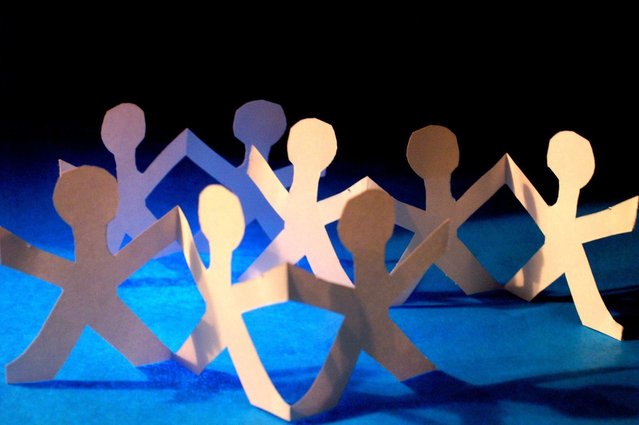
When you have a special-needs child, there are plenty of things that you wonder if your child will ever be able to do. So when they actually happen – when you hear your five-year-old say I love you, even though it’s echolalic, or when your child sleeps in their own bed, or doesn’t wet it, or when he holds a pencil for the first time, or pets a dog – we note the occasion with much fanfare, and rightfully so. We know the effort involved in making those things happen, how long we waited, how much we hoped. They are nothing less than miracles.
But milestones don’t happen every day, of course. If they start happening every day, they’re no longer milestones. They become part of our daily life, the status quo. They are the everyday. And sometimes I find as much hope in the everyday as I do in the milestones. Why? Because we can’t live from milestone to milestone. We live from day to day.
My son was diagnosed with autism at the age of three and did not start talking until he was five. In 1997, we didn’t know for sure if he could learn to talk. And so when he slowly got started – first with various stages of echolalia, then, when he was using more spontaneous speech, learning pronouns, articles, tenses, and syntax – I was overjoyed. It didn’t matter to me that his voice was always flat, usually expressionless. I figured it would always be that way, and I loved it. I never even hoped that he would develop voice inflection because I was just glad to hear his voice in the first place.
Two years ago, our regional autism consultant created a weekly social skills class for my son to attend at his school, so that he could learn to communicate more appropriately with his peers. The object of the class was to instill conversation skills and teach socially appropriate behavior as well as how to interpret gestures and non-verbal communication. But something unexpected happened, and I can only attribute it to the social skills class. About three months after he started the class, I began noticing that he was using voice inflection. And he was doing it appropriately, not just random variations. He was putting emphasis on the right words and his tone was no longer as flat. And he’s been doing that for almost two years now. The boy who, for so many years, could only parrot lines from Disney movies or Scooby-Doo cartoons when he wanted to interact with people is now regularly conversing with voice inflection. That is now my everyday. And that is what gives me hope.
It’s true, the milestones sustain us. They are remarkable, miraculous, and worth every bit of celebrating. But when you sit down and stop to think about it, when you realize, hey, we’ve been using the PECS cards for three months now and my child rarely shrieks at home anymore, thank God, that is your everyday. That is where hope lives.
I’ve had many different everyday realizations over the years. In fact, that one about the PECS cards was one of them, over twelve years ago. Then I had another one a few years later when I realized that we were no longer using the PECS cards. There have been many other everyday realizations, equally hopeful. But now, my son is speaking with voice inflection, an unexpected gift, and that is now my everyday. What’s yours?

Tonight was the monthly Southern Oregon Autism Support Group meeting that I facilitate. We had a low turn-out, probably due to illness, but it was one of the best meetings we’ve ever had. For one thing, two new members attended, so that was great. For another thing, they were the only two members who attended. And as much as I love when we have a big turn-out, when only three people are present, you can really talk.
Since one of them was new to the area and the other one was new to the diagnosis, we started off by talking about local resources. It’s a short list for our area, unfortunately, but I think I gave them a few good leads. We moved on to listing various topics of discussion that we can focus on for future meetings, topics that would be most helpful to everyone (since our group consists of parents of preschoolers to adults). I want this support group to be as beneficial as possible. And that led me to mention one of the topics that I’d like to feature at a future meeting – the emotional issues we face as ASD parents. Usually that area is relegated to the professionals. But what if you can’t afford a therapist or don’t have the time to see one regularly? And if the therapist doesn’t have a child on the spectrum, how are you going to feel that total support and understanding that you feel when you’re talking with other ASD parents?
One of the new members, a mother of a 24-year-old son with Asperger’s, opened up and talked about how hard it is receiving the wedding invitations and college graduation announcements of her friends’ children. How difficult it is when your child doesn’t meet the typical milestones. And I knew – oh, how I knew the emotions she described. It’s not that our children have disappointed us – it’s not that at all. It’s that we wish things didn’t have to be so hard for them, and for us. It’s that we fear the future. For some of us, it starts with the not-pointing-at-things-to-show-them-to-us. Then there’s the not-talking. For others, it’s the not-potty-training or not-making-eye-contact. Or all of the above. And plenty more.
But then, while talking, we realized that our kids have different milestones, and that’s okay. Because whether or not they ever meet those typical milestones, we celebrate the ones they do meet. Like, in Neil’s case, not shrieking in a public restroom – that was huge for me. Being mainstreamed in a regular classroom (with full-time one-on-one aides, but still – huge). Going to the grocery store without distress – anywhere, really. Those are some of my milestones. And only those close to us and other ASD parents can really get how huge those milestones are.
Take for example, when I was at work yesterday. The boys were home because of Veterans Day, but Neil needed to go to his school for wrestling practice (participation in a team sport – huge!) for two hours. Since he’s been successful with riding his bike to and from school every day, I took a major leap of faith and thought that he could handle riding there and then home afterward. I told him he had to call me as soon as he got home to let me know. We calculated that he would be home by 10:30 and would call as soon as he put his bike away. Adam would be home to let him in.
So I’m at work and 10:30 rolls around. Of course, I’ve been anxious pretty much the whole morning. But the phone rings right on time (big!), and it’s him. However, from the background noise, I can tell that he’s not at home. Semi-panic, or pre-panic, sets in. “Where are you?” I ask. He tells me that he’s still at the school, that he was mistaken about the time practice started, which was an hour later than he’d thought, so he wouldn’t be home for another hour. So, even though his instructions had been to call me when he got home, he realized that he should call me at 10:30 anyway to let me know that the situation had changed. He didn’t say that, but that’s what happened. And I about fell out of my chair in shock.
I thanked him for being so responsible. I could barely get the words out. Dumbstruck, I turned to my co-worker to try to share the moment with her. Of course, she didn’t get it at all. What’s the big deal about a 15-year-old doing that? I tried to turn it into a teachable moment by describing my son’s challenges and how autism affects him. Not a flicker of understanding.
But tonight at the meeting? Complete empathy. They totally got why that was huge without me explaining it. I felt validated. I felt understood. I didn’t feel alone. And that, my friends, is the whole reason for a support group.
We have different milestones for our kids, but we do have them. And it’s so affirming to know people who understand those milestones, and celebrate them with us. My co-worker has known me for five years and didn’t understand. Those two women had known me for one hour, and they were celebrating with me. Best. Meeting. Ever. And that’s a milestone too.
Image credit: Stephanie Hofschlaeger



